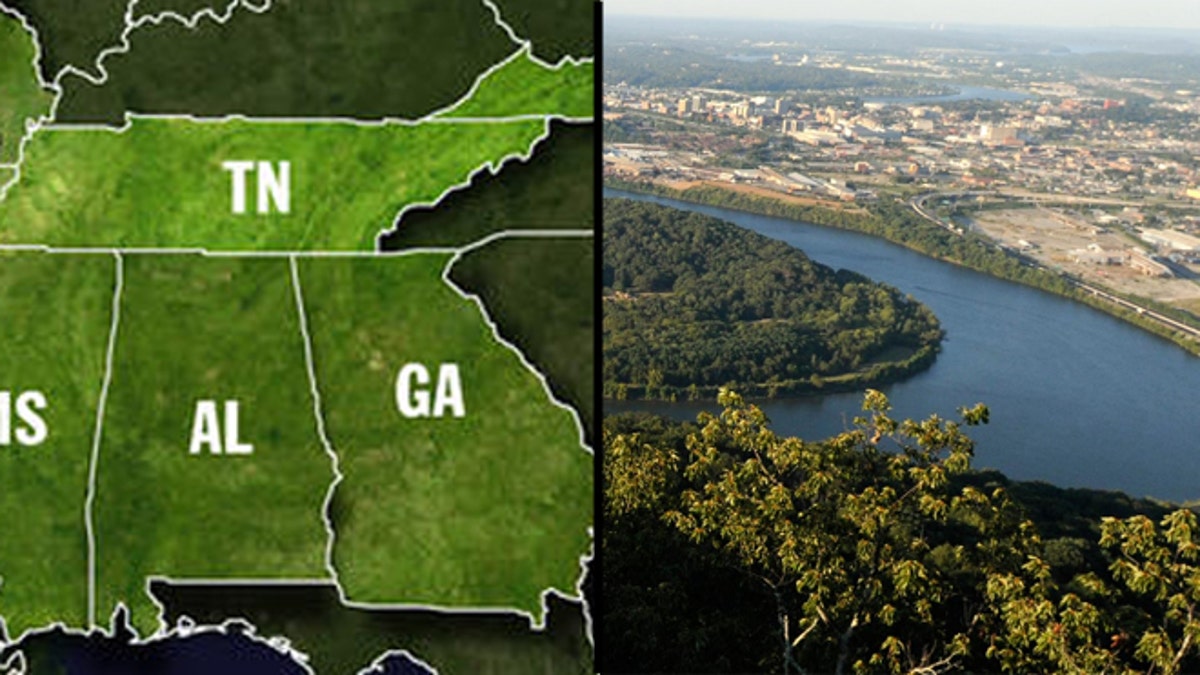
(AP/City of Chattanooga)
Georgia residents are thirsty for Tennessee water. And state lawmakers are willing to try and move the border in order to get it.
Lawmakers in Atlanta, at the start of a new legislative session, are quickly moving to renew efforts to tap into Tennessee’s water supply by contesting the state’s border with its northern neighbor. The Georgia House of Representatives voted 171-2 this week to adopt a resolution seeking a thin strip of land leading to the Tennessee River.
That would give drought-parched Georgia a slice of the water rights. Tennessee lawmakers say Georgia can keep dreaming -- and they are ready to do whatever it takes to protect their water from Peach State poachers.
“I don’t think anyone's taking it seriously,” Tennessee House Majority Leader Gerald McCormick said.
That’s news to Georgia Rep. Harry Geisinger, who is leading the charge to reclaim the water rights he feels belong to the state.
Geisinger said getting Georgia “the water it’s owed” is a priority. He adds that while the state’s water supply is “fine” now, it won’t stay that way in 15 years.
“We need to look ahead,” he said.
Geisinger believes the state has a right to tap the Tennessee River which has long been recognized as an underused water source.
Atlanta’s population has skyrocketed in the past two decades and, with it, so has its need for water. Many believe the best way to deal with the demand is to take water from the river across the state line. That doesn’t sit well with Tennessee officials but Geisinger says they need to get over it because the water doesn’t belong to them anyway.
Geisinger said the northern border of Georgia and the southern border of Tennessee were “established at the 35th parallel of north latitude and would have been located on the northernmost bank of the Tennessee River at Nickajack.” Nickajack is a lake connected to the river. He argues that two representatives – one from each state – put in charge of creating the border in 1818 got it wrong.
Geisinger theorizes that “unfriendly Indians” could have been behind the messed-up marking, which he says is more than a mile from where it should rightfully be.
He also alleges that the 30,000 Tennessee residents near Chattanooga who could become Georgians if the border were redrawn are purposely holding up the process because they don’t want to pay Georgia’s 6 percent income tax. Tennessee does not have one.
The water wars between Georgia and Alabama aren’t new, but as each legislative session passes the chip on some Georgia lawmakers' shoulders gets a little bit bigger, one Tennessee legislative aide told FoxNews.com.
When Georgia tried a similar push a few years ago, an aide to Chattanooga, Tenn.’s mayor, dressed in frontier buckskins and a Davy Crockett hat, crossed the state line and delivered a truckload of bottled water to lawmakers in Atlanta. The stunt was an attempt to bring some levity to the nearly 200-year issue.
State Sen. David Shafer took the opportunity to ratchet up his own rhetoric. Shafer told colleagues he accepted the water as a “down payment on the billions of gallons of Georgia water that feeds the Tennessee River from the creeks and streams of northwest Georgia.”
Others weren’t so amused.
“They acted like children,” Geisinger told FoxNews.com Friday.
Georgia’s water war isn’t limited to Tennessee. The state has a storied history of not playing nice with its neighbors and is currently locked in another fight with Alabama and Florida. Last year, Alabama and Florida officials filed petitions with the U.S. Supreme Court seeking review of an appellate court decision in June that gave Atlanta rights to Lake Lanier.
Georgia’s neighbors to the south hope to reverse a ruling by the 11th Circuit Court of Appeals in June that overturned a 2009 lower court decision that said Atlanta had no right to water in the federal reservoir. U.S. District Judge Paul Magnuson told the states they had to reach an agreement on downstream water releases or else he’d pull metro Atlanta’s access to the lake, which would leave 3.5 million without a source of water.




